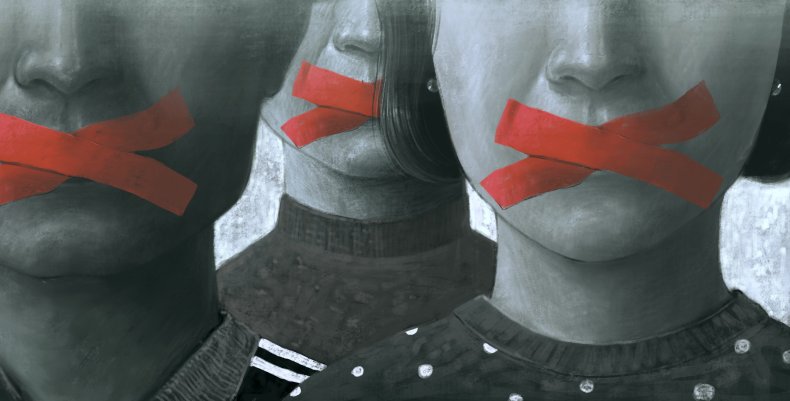Last March, Stanford Law students protested when a Trump-appointed judge spoke on campus. An administrator intervened, defending her students' and the judge's right to speak. Her actions nonetheless triggered a rightwing campaign demanding her ouster, and last week, Stanford announced the administrator will not return.
To borrow from modern parlance, she was "cancelled."
The story is one of many examples, a reoccurring dynamic in which students speak, then administrators respond (or don't), followed by pundits decrying "cancel culture" and a "free speech crisis." These pundits are in fact right, though not in the way they think. Free speech is under attack. But the students aren't to blame.
The true threat to free speech in this country is coming from another corner entirely, and it's this: One of our major political parties now governs on a platform of discriminatory censorship, and contrary to what its defenders will tell you, it's not the Left but the Right that is doing the lion's share of censorship.
Since 2020, we've seen hundreds of "anti-CRT" and "Don't Say Gay" bills; thousands of book bans; efforts to defund libraries; campaigns to silence faculty, erode academic freedom, and gut university independence; laws that disenfranchise voters, criminalize protest, outlaw reproductive freedom, and seek to erase trans kids; the Jim Crow-styled expulsions of Black officials; a potential pardon for a convicted murderer because he killed a #BLM protester; and organized threats and harassment targeting DEI officials.
The record is clear. Yet many who bemoan "cancel culture" remain silent as the GOP makes cancelations its brand.
The silence is deafening. The dissonance is indefensible.

Even worse, many celebrate this campaign. There are rightwing coalitions who weaponize the rhetoric of "discomfort" and "parents' rights" not to protect students or promote speech but to purge disfavored policies, principles and people.
But while the Right has turned censorship into a defining feature, what you're seeing on the Left is not students silencing others but simply how a university setting should play out.
We often hear that universities should be "neutral" with respect to speech and opinion. But that's only true sometimes. As "regulators," universities must often permit disfavored viewpoints, but universities are also "speakers," with an independent mandate to teach, research, and pursue truth for the common good. And this requires taking sides.
We wouldn't expect a science department to stay silent when a speaker denies climate change; we wouldn't expect a Jewish Studies department to stay silent when a speaker denies the Holocaust. As First Amendment scholar Steven Calabresi puts it, universities "could not even function if they did not choose to praise some viewpoints and criticize others." Distinguishing good ideas from bad ideas "is basically at the core of what education itself is all about."
Nor must universities be agnostic about the basic dignity and humanity of their communities. To their credit, many celebrate diversity, equity, and inclusion—values necessary to build a vibrant community and further a university's legal duty to prevent harassment on campus. When a speaker traffics in racist discourse, delegitimates students, or questions their presence on campus, the university should counter those viewpoints.
This is particularly true in a moment marked by organized attacks targeting people of color, LGBTQ+ people, and religious minorities. Those who shout "indoctrination!" to discredit antiracism or DEI know that neutrality is an illusion. Opposing tolerance, compassion, and inclusion doesn't create a university without values. It fosters a university with different values—those of an era when most Americans had no seat at the table.
We often hear that conservative students must navigate an unfriendly campus climate. Yet while we view the classroom as a sacred place where everyone—conservative or liberal, socialist or libertarian—should feel welcome and valued, we are troubled by stories that privilege the feelings of conservative students—who suffer neither presumptions of incompetence nor the denial of their very identities—after decades in which even the mainstream press belittled similar concerns from students of color. Many still mock "microaggressions" and ridicule students who protest racist speech as "oversensitive" "snowflakes." Yet those same voices rehearse their own claims in the register of microaggressions, linking grievances to numerical underrepresentation, perceived verbal slights, and biased professors and classmates.
Commentators routinely caricature students as intolerant children. Even absent petty insults, many admonish students for protesting the wrong way. We understand. When a speaker aims merely to provoke, even thoughtful protest can "feed the trolls." Still, we are troubled when professors and pundits claim authority over the right way to speak. Students might be younger and less experienced, but students deserve our respect. They see the existential crises confronting their generation, democracy, and planet. They recognize a Supreme Court that privileges dogma over doctrine. They know that power often trumps persuasion.
If we believe in persuasion over coercion, our job is to persuade our students, not scold them. If we dislike their tactics, perhaps we should question our own arguments and assumptions before blaming students for demanding the world they deserve.
Academic freedom is "not the absolute freedom of utterance of the individual scholar, but the absolute freedom of thought, of inquiry, of discussion, and of teaching, of the academic profession." Rightwing ideologues have abandoned academic freedom; they seek instead to control knowledge.
Florida governor Ron DeSantis' hostile takeover of New College, rejection of AP African American studies, and whitewashed African American history standards offer chilling examples. In roughly two years, DeSantis has effectively empowered himself to dictate what teachers and students teach, learn, and even think.
This is what cancel culture looks like. This is our free speech crisis.
Jonathan Feingold is an Associate Professor at Boston University School of Law. Angela Harris is Professor Emerita at the University of California, Davis School of Law. Athena Mutua is a Professor of Law at University at Buffalo School of Law. The are members of the Critical (Legal) Collective.
The views expressed in this article are the writers' own.








